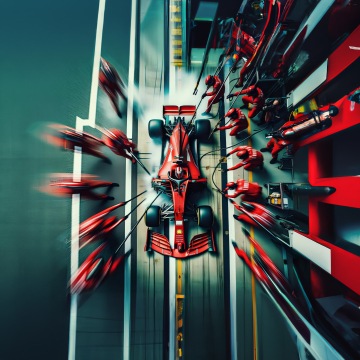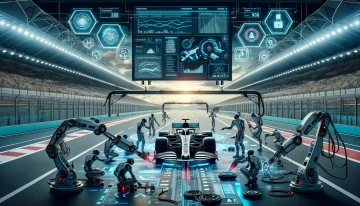The Near Future of DevOps – Preparing for a Formula 1 Race
2 years ago
DevOps profoundly impacts the efficiency and operability of companies. Without mastering DevOps at the highest level, businesses lose the ability to quickly respond to market opportunities, changing customer needs and desires, and organizational changes. Setting up DevOps is akin to preparing for a Formula 1 race.
Imagine DevOps as a Formula 1 racing team, where every aspect of the racing team symbolizes different parts of DevOps processes and new trends that will emerge in the coming years. Every team member, every tool, and every strategy is meticulously tuned to achieve the best possible results.

Automation on a New Level
Automation in DevOps is like a precise pit crew in a racing team, rapidly changing tires and refueling. Advanced automation tools enable fast deployment, testing, and application updates, minimizing the risk of errors and significantly boosting productivity.
Container Orchestration
Container orchestration, such as Kubernetes, is like a team manager strategically directing all movements and decisions on the track. Orchestration ensures that each container runs where it’s needed, and resources are optimally utilized.
AI and Machine Learning in DevOps
AI and ML in DevOps are like advanced telemetry systems and data analysis in a racing team. These systems collect and analyze vast amounts of data in real-time, providing predictive analytics and recommendations. In a Formula 1 race, these systems can predict when a car will encounter issues or the best time for a pitstop. Similarly, in DevOps, AI and ML tools can predict outages, identify anomalies, and optimize application performance, enabling faster and more efficient problem resolution.
GitOps
GitOps is like the history of race results and car modifications records, allowing the team to revert to optimal settings when needed. Git repositories act as the source of truth, where everything is versioned and tracked. Whenever issues arise, the team can quickly identify changes and revert to a previous stable version. GitOps ensures that the entire deployment and infrastructure management process is transparent and controlled.
Security as Code
Security experts in DevOps are like the race commissioners on the track, ensuring all cars meet strict safety standards. In the future, security will be even more integrated into all aspects of software development and deployment. Security measures will be automatically implemented and monitored, ensuring that no car (application) hits the track (production environment) without thorough checks.
Microservices and Serverless Architecture
Microservices and serverless architectures are like the modular design of racing cars, where each component can be easily replaced or upgraded without affecting the entire car. This flexibility allows for rapid and frequent changes and performance improvements. Similarly, in DevOps, these architectures enable faster and more flexible application development and deployment, increasing scalability and reducing infrastructure costs.
Observability and Monitoring
Advanced observability and monitoring tools are like the telemetry and sensor data from a car, providing detailed insights into performance and enabling quick responses to any anomalies or issues. In the future, these tools will be even more sophisticated, allowing real-time monitoring and analysis of application performance, identifying issues before they affect users, and providing detailed system status overviews.
Hybrid and Multi-Cloud Strategies
Hybrid and multi-cloud strategies are like the different types of tracks and surfaces a racing team must master. The team must quickly adapt to various conditions and optimize car performance for each track type. Similarly, DevOps teams will need to manage and automate deployments and operations across different cloud environments, increasing flexibility, redundancy, and cost optimization.
Low-Code and No-Code Platforms
Low-code and no-code platforms are like simulators and training tools that allow less experienced drivers (developers) to practice and create new strategies. These platforms will enable faster application development, as even non-technical users can create and manage applications, speeding up development cycles and reducing the burden on development teams.
Are You Ready for Your Race?
Just like in a Formula 1 race, where victory depends on a combination of cutting-edge technology, teamwork, and continuous improvement, the future of DevOps rests on these pillars. Automation is our racing car, driving us forward, shortening cycle times, and increasing efficiency. AI and machine learning function as our advanced sensors and telemetry, providing deep insights and predictive analytics, while GitOps and security as code ensure our car is always in optimal condition and safe to race.
Just as in racing, where adapting quickly to changing track conditions is essential, DevOps teams must be prepared to respond to new challenges and innovations. Hybrid and multi-cloud strategies bring the flexibility and scalability that modern businesses need, while microservices and serverless architectures enable rapid and efficient deployment.

In this ever-evolving race, it is clear that the teams that can best leverage new technologies and trends will have the edge over the competition. DevOps is not just about speed but also about reliability, security, and the ability to adapt quickly. Looking ahead to the future, we see that the race will become even more intense, and only those who can continuously innovate and improve their processes will stand on the winner's podium.
As the DevOps racing car speeds forward, it is clear that the path to success lies in the synergy of people, processes, and technologies. Prepare yourselves, because the future of DevOps will be fast, dynamic, and full of surprises.

Petr Růžička
CX Consultant Lundegaard